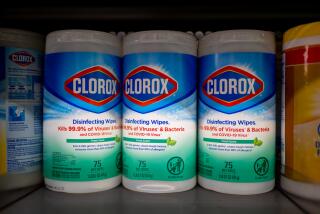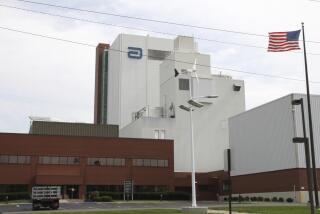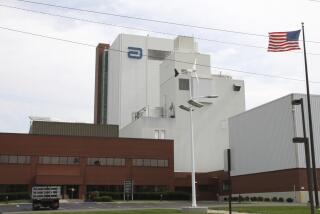Vaccine in Plant Appears Unsafe
- Share via
U.S. health officials said Friday that none of the flu vaccine at Chiron Corp.’s factory in Britain appeared safe to use after finding evidence of bacterial contamination at the plant.
Lester Crawford, acting director of the Food and Drug Administration, in effect endorsed the British decision to shut down the plant in Liverpool this month, a surprise action that has caused a massive shortage of vaccine for the coming flu season. The Chiron factory had been slated to supply half the flu shots in the United States.
“We did enough testing to conclude that we could not guarantee the safety of any of the vaccine,” Crawford said.
Even so, he said the FDA, in a longshot quest to find usable supplies, would examine the approximately 6 million doses of Chiron vaccine that already had been shipped to this country. “We do not want to create false hope, but we want to explore every option,” he said.
In the end, though, it’s highly doubtful that any safe doses will be found. “We believe all the lots produced ... are suspect at this point,” Crawford said.
Crawford made his comments at a news briefing as the FDA finished a weeklong inspection of the Liverpool factory, which had been preparing to deliver 46 million to 48 million doses of Fluvirin vaccine to the U.S.
The FDA launched its review Oct. 5 after the Medicines and Healthcare Products Regulatory Agency, the British counterpart to the FDA, suspended Chiron’s license to operate.
The disruption of the vaccine supply has prompted long lines at clinics, reports of price gouging and government investigations of Chiron’s conduct and of the FDA’s oversight of the company.
Chiron first reported bacterial contamination at the plant Aug. 25, and the FDA relied on weekly reports from the Emeryville, Calif., company to monitor its progress toward solving the problem.
Chiron has said that it had no idea that its ability to supply vaccine was in serious jeopardy and has maintained that its product was safe.
Responding to the FDA’s findings, the company said in a statement Friday that it “profoundly regrets” its inability to provide vaccine and that it was “committed to resolving the concerns raised by regulatory authorities” so that it could resume shipments next year.
While the FDA defended its system for assuring factory quality, critics blasted the agency.
“Today’s finding of contamination at the flu vaccine plant is a dollar short and a day late,” Rep. Henry A. Waxman (D-Los Angeles) said in a statement. “Americans deserve to know why the FDA did not identify these problems months ago.”
Crawford said that on Oct. 5 the FDA was just hours away from reviewing the same records that had prompted British authorities to shut down the plant. “We definitely would have found the problem, and we would have found it on the same day the British announced their conclusions,” he said.
The FDA inspectors said the plant was guilty of violations of “good manufacturing practice,” raising concerns about the extent of contamination, Crawford said. The contamination appeared to occur late in the manufacturing process, he added, when the vaccine is transferred to individual vials.
Geoffrey Porges of Sanford C. Bernstein & Co. said the reference to “good manufacturing practice” probably related to the methods that Chiron used to ensure that its vaccine was sterile. In vaccine production, it is not possible to sample every vial, so manufacturers randomly test individual lots for contamination to determine whether the shots are safe.
Porges said it now appeared that Chiron must develop and validate new laboratory tests and procedures -- a process that can take many months. Chiron, the FDA and its British counterpart could be up against a tight deadline as they try to get the Liverpool plant ready for the 2005 flu season, he said.
Chiron is facing a criminal investigation by the Justice Department and a probe by the Securities and Exchange Commission. Experts said the inquiries probably would focus on whether the company properly disclosed its vaccine problems to U.S. regulators and investors. The company has hired Skadden, Arps, Slate, Meagher & Flom to handle all its vaccine-related legal matters.
Meanwhile, Chiron said Friday that Richard Wills, chief executive of Tektronix Inc., resigned as a director after just five weeks. Wills had joined Chiron’s board Sept. 8. The company offered no further details, and Wills couldn’t be reached.






